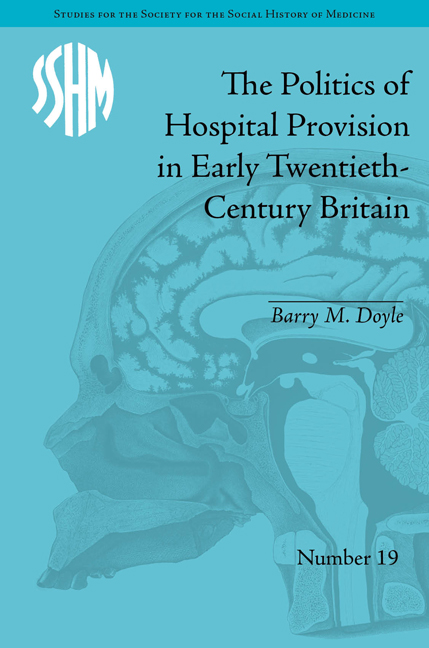Book contents
- Frontmatter
- CONTENTS
- Dedication
- Acknowledgements
- List of Tables
- Introduction
- 1 Leeds and Sheffield: Economic, Social and Political Change
- 2 Hospital Provision: Voluntary and Municipal
- 3 Patients and Access
- 4 Specialization and the Challenges of Modern Medicine
- 5 Finance
- 6 The Politics of Hospital Provision
- 7 Co-operation, Competition and the Development of Hospital Systems
- Conclusion
- Notes
- Works Cited
- Index
1 - Leeds and Sheffield: Economic, Social and Political Change
- Frontmatter
- CONTENTS
- Dedication
- Acknowledgements
- List of Tables
- Introduction
- 1 Leeds and Sheffield: Economic, Social and Political Change
- 2 Hospital Provision: Voluntary and Municipal
- 3 Patients and Access
- 4 Specialization and the Challenges of Modern Medicine
- 5 Finance
- 6 The Politics of Hospital Provision
- 7 Co-operation, Competition and the Development of Hospital Systems
- Conclusion
- Notes
- Works Cited
- Index
Summary
General histories of hospital services in the first half of the twentieth century often highlight the variability in provision between towns, pointing to the serendipitous and illogical foundations of voluntary hospitals and the restrictions imposed by finance and political preference on local authorities. Yet this, as Pickstone has noted, under-estimates the fact that local need shaped by economic, social and political structures was often the vital component in determining hospital services in the fifty years before the NHS. Admittedly, a number of studies have demonstrated the importance of local financial resources and political cultures on the form services took but these rarely consider how socio-economic structures may have created specific needs resulting in unique patterns of provision. Thus, to understand fully the influences on hospital services, finance and management regimes in Leeds and Sheffield, it is necessary to explore their changing urban ecology. In particular, we need to explore how the fate of both the individual hospitals and the broader citywide provision were determined by longer-term developments in economic specialization, class structure, the role of gender in the workforce and the scale and nature of trade unionism along with shorter-term factors such as the impact of unemployment and the outcome of municipal elections.
- Type
- Chapter
- Information
- Publisher: Pickering & ChattoFirst published in: 2014



